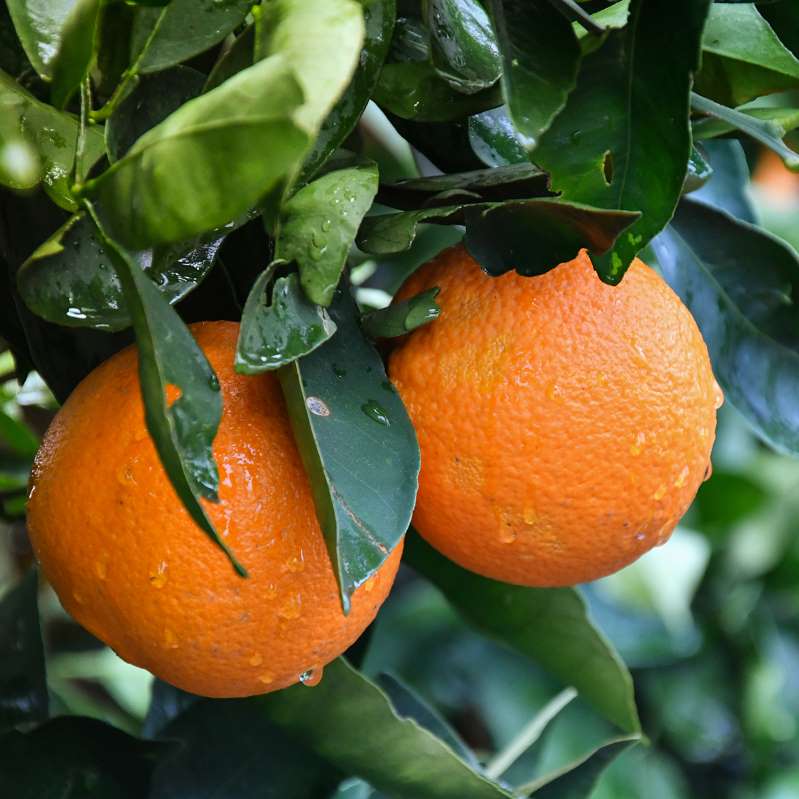The Health Benefits of Oranges Go Well Beyond Vitamin C
By : Megan Falk
If the word “orange” were to pop up during a game of Catch Phrase, there’s a hard chance the first clue you’d scream to your teammates after “round fruit” is “vitamin C.” And while this definitive, good-for-you quality of all navels, cara caras, and valencias (all different varieties of oranges, btw) would definitely score you the winning point, it’s not the only health benefit of oranges. “The beauty of an orange is the combination of all of its nutrients–it's the package,” says Keri Gans, M.S., R.D.N., C.D.N, a Shape Brain Trust member. Here’s exactly what’s included in this softball-sized fruit, plus easy ways to incorporate it into your diet when you don’t want to eat a slice straight up.
Oranges are loaded with vitamin C.

You first learned this fact back in your middle school health class, but it’s worth repeating. One of the most significant health benefits of oranges is their vitamin C content, which is about 70 milligrams, or 93 percent of the recommended dietary allowance, in a medium-sized fruit, according to the United States Department of Agriculture (USDA). This potent antioxidant may help strengthen the immune system by stimulating the production and improving the function of white blood cells, including the specific cells that attack foreign bacteria and viruses, and increasing levels of existing antibodies that help fight off foreign antigens, according to research. This antioxidant-power also helps block some of the damage caused by free radicals, which are made when you’re exposed to tobacco smoke or radiation and can lead to skin aging, cancer, heart disease, and arthritis over time, per the U.S. National Library of Medicine (NLM). (BTW, vitamin C can do wonders for your skin too.)
Aside from the nitty-gritty health benefits of oranges, the fruit’s vitamin C can make you feel *and* look your best. The nutrient plays a key role in the absorption of iron, which helps make red blood cells. Without absorbing adequate amounts of iron, there’s a good chance you’ll feel sluggish and tired, says Gans. Plus, vitamin C may help you achieve that sought-after healthy glow by helping your body produce collagen–a protein that’s essential to keeping your skin smooth, firm, and strong, she adds. How? The nutrient helps stabilize the collagen molecule structure, stimulates messenger RNA molecules, and tells the skin’s fibroblasts (the cells in your connective tissue) to create collagen, according to an article in the journal Nutrients.
Oranges are an easy source of fiber.
If you’re in a monstrous snack-attack mode, consider reaching for an orange instead of a bag of Goldfish crackers. A medium orange has about 3 grams of fiber, according to the USDA, which can help you feel satisfied, says Gans. “Even a simple orange as a dessert to a meal can help fill you up so you’re not hungry two hours later,” she says. More good news: Fiber can help lower cholesterol levels and prevent constipation, Gans adds. Your gut will definitely be sending you a thank you note for this nutritious choice.
Oranges contain folate, an essential nutrient for women.
Of all the health benefits of oranges, this one is most significant for women who are pregnant or thinking about becoming pregnant. Folate, a nutrient that helps make DNA and aids in cell division, is essential in reducing the risk of neural tube defects (aka malformations of the spine, skull, and brain) that occur within the first three to four weeks after conception, according to the National Institutes of Health (NIH). This is why you hear ob-gyns suggest a prenatal vitamin regimen than includes folate. Since nearly half of all pregnancies in the U.S. are unplanned and gestation defects may happen early in the pregnancy, the NIH recommends women get 400 micrograms of the nutrient even if they’re not trying to conceive. Luckily, oranges can help you get one step closer to hitting that target, packing 29 micrograms per small fruit.

Oranges can help you fill your potassium quota.
While bananas are known for being the potassium superstar in the supermarket’s produce section, oranges can help you get your fill of this mineral too. One medium orange boasts 237 milligrams of potassium, according to the USDA, while one cup of freshly squeezed OJ has 496 milligrams or 11 percent of the recommended dietary allowance. Along with helping your kidneys and heart function properly, this health benefit of oranges may help decrease blood pressure. High sodium intake is linked with high blood pressure, meaning the heart pumps more blood and the arteries are narrower than normal. When you consume potassium, your blood vessels widen and you excrete more sodium through your urine. This process minimizes the force of your blood against the arteries and reduces the volume–and thus size–of plasma (which carries salt, water, and enzymes) in the blood, ultimately lowering blood pressure, according to the NIH.
The fruit contains a nutrient that promotes good eye health.
The nutrient that gives an orange its signature vibrant color could also improve overall eye health. Oranges contain 14.4 micrograms of vitamin A in the form of beta-carotene, a compound that may play a role in reducing the risk of age-related eye diseases that lead to vision loss, according to an article in the journal Clinical Interventions in Aging. Vitamin A is also an essential component of rhodopsin, a protein that absorbs light in the retina, and supports the functioning of the cornea, per the NIH. “Just know that you’re not going to see an improvement in your vision unless you’re deficient in it,” says Gans. Since oranges offer just 2 percent of the recommended daily allowance of vitamin A for women, make sure to also load up on sweet potatoes, spinach, and carrots to hit that quota.
The Best Ways to Get *All* the Health Benefits of Oranges
While simply peeling the fruit and munching on a slice will help you reap the health benefits of oranges, it’s not the most creative way to get this package of nutrients. Instead, try adding orange slices to a salad for a burst of fresh flavor, grilling them for five to 10 minutes for a charred side dish, or dipping them in melted dark chocolate for an easy dessert, suggests Gans.
If you have freshly squeezed or bottled, 100-percent orange juice on hand, incorporate some into a smoothie, marinade, or dressing, which will add a naturally occurring sweetness and extra health benefits, says Gans. “Better yet, freeze the juice into ice cubes and drop them in seltzer or add them to vodka for a cocktail–that would be so delicious,” says Gans.




